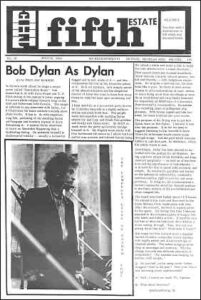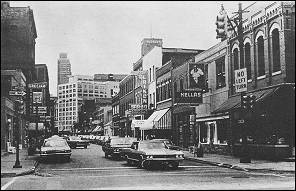Fifth Estate 10, July 15, 1966 Add to the Bookbuilder

Bob Dylan
Paul Jay Robbins
Bob Dylan as Dylan
Part 1 of 3
In Dylan’s sixth album he sings a major poem called “Desolation Road.” One stanza has to do with Ezra Pound and T.S. Eliot sitting in the captain’s tower arguing for power while calypso dancers leap on the deck and fishermen hold flowers. The image is relevant to any interview with Dylan, for it illustrates his basic attitude towards showplace words. It has to do with experiencing life, partaking of its unending facets and hangups and wonders instead of dryly discussing it. A typical Dylan interview is more an Absurdist Happening than a fact-finding dialog. He presents himself in shatterproof totality—usually a somewhat bugged and bored mode of it—and lets components fall out as the interview pokes at it. He’s not taciturn, he’s simply aware of his absurd situation and the desperate clamor of folks who want to know how many times he rubs his eyes upon awakening and why.
Mar 2, 2023 Read the whole text...
John Sinclair
Magdalene Sinclair
The Coatpuller
a column by John & Magdalene Sinclair, for once
“any image around which any people concentrate & omit themselves is a usable one just because it is theirs.”
—Charles Olson, Apollonius of Tyrana
I am talking to you people who read this paper. Are you there? What then do you want? You have it in your power now to create a vital living situation here in Detroit and make it in your own image—-if you have the will & commitment to such a situation. If you don’t care if Detroit ever gets to be such a place, it won’t. It will stay just as it is now—a burgeoning police state, with isolated groups of people fighting each other and ignoring each other but never working together to make a decent place of this place. And this newspaper, which could be so great and such an important community newspaper, will continue to flounder because its editor gets so little help, and there is so little response to calls for help, aid, participation, etc., that are issued in it. I am thinking particularly of the Artists’ Workshop Society, which is part of my own life, and which is about to die out because my wife and her few helpers have received so little support from you while I’ve been gone these last four and a half months—just when they’ve needed help most. If you want to have Detroit as a real, alive, worthwhile place to live and work in, you’ll have to make it that way yourselves, since the city rulers aren’t going to help, they’ve proved that, and the commercial interests never want to make a place for something new and vital but will capitalize on it when it appears and grows. You dig? What I mean is that we are all going to have to start working with each other on all fronts, help each other out, and take advantage of what are our local possibilities—like this newspaper, like the Artists’ Workshop and the West Central Organization, the Concept East Theatre, the Detroit Committee to End the War in Vietnam, the SDS Free University, Kenneth V. Cockrel for state representative, etc., etc. —all of these are manifestations of the same essential concerns, that Detroit be a vital human place for all of us.
Mar 3, 2023 Read the whole text...
Clay Carson
Black Power for Watts?
reprinted from the L.A. Free Press
“Given a city government that is unconcerned about the problems of the people of South Central Los Angeles, a Mayor who considers these citizens to be hoodlums and a Chief of Police who considers them to be monkeys, the only alternative to violence on both sides is for a separation from that city government and the institution of another one with powers assigned by the people it serves.”
Mar 3, 2023 Read the whole text...
Fifth Estate Collective
Anti-Napalm Protest
VOICE, the University of Michigan Chapter of Students for a Democratic Society has called for regional action Aug. 8 at the Dow Chemical Corp. in Midland, Mich., protesting that company’s production of napalm for use on Vietnamese villages.
Members of the participating organizations will travel to Midland on August 7th to attempt to mobilize community support against napalm production there much in the same way a group of citizens did in Redwood City, California. On Monday, August 8th, there will be a mass demonstration at the Dow Chemical plant. Participants are expected from all across Michigan and Northern Ohio. The Detroit Committee to End the War in Vietnam voted July 13 to support the action and will coordinate travel arrangements and publicity for the Detroit area. The Committee may be contacted at its office at 1101 W. Warren.
Mar 5, 2023 Read the whole text...
Fifth Estate Collective
Peace Briefs
DETROIT: Six weeks ago the News Editor of the FIFTH ESTATE sent an inquiry to the Defense Department regarding the validity of an article in the VIETNAM COURIER, a paper published in Hanoi, reflecting the political positions of that country. The article in question appears in May 12, 1966 edition and claims that a battalion of the First Infantry Division mutinied and refused to fight on April 24, 1966 at Lai Khe. It further claims that several soldiers were shot by their own officers in an attempt to force them into battle. Also, several suicides by men of the First Battalion were reported. As of July 13 no answer has been received from the Defense Department. In a further attempt to ascertain the truth of the situation copies of all correspondence have been sent to Cong. Charles C. Diggs (D-13th district) asking him to investigate the matter. Nothing has been heard from him to date.
Mar 5, 2023 Read the whole text...
Dan Georgakas
Elegy for Greektown

When I saw the olive oil had been diluted in what was once the most simpatico of Greektown restaurants, I heard the death rattle of Greektown. The first major casualty was the old Kozani Cafe (today’s Pink Panther) where there used to be wooden pegs for coats and old men would sit on an ouzo all night watching the young guys dance and fight. There were no belly dancers in those days, just good hill and country Greek music like you have a hard time finding even in Athens. One old “theo” played an instrument similar to Zorba’s except on Thursdays when he went with a young whore who worked the area regularly. That was during the days before urban renewal knocked out most of the houses where the pensioners lived and destroyed the interesting Greek-Negro community of the area. That was before the funeral home had to relocate. That was when the musicians could find work in their own city. That was when Big Mike ran the Laikon and the cops spent a frustrating afternoon tracking down a tip linking a Mr. Papagalous with a murder (Mr. Papagalous was a parrot). That was when the Greeks played most of the bar but in the backrooms and there was no junior executive trade jamming into the Lafayette Bar causing a nervous Sam to turn away tieless ethnic trade. The barber shop remains. The newspaper still publishes. Grocery stores carry on. A few tough coffeehouses of the old dozen. But the entrepreneurs are modernizing. The salads shrink, the price of feta cheese (imported from Italy these days) goes up. There are signs in the windows to guarantee in print that you are a friend as well as a customer. The city fathers have become aware of their tourist gem and the basest aspect of the Greek merchant personality has responded to civic duty. Coney island joints (symbol of bastardized Greek-American palate) have appeared. One thanks the Olympic gods for the Stemma Bakery which still produces the raw materials needed for homemade pastries. But nothing has been the same since Greekness was officially discovered during the time of Never on Sunday. I won’t bother to tell you that Pireaus whores aren’t really like that, nor Greek villagers like the animals you saw in Zorba. A certain stereotype of Greekness has been fashioned and now the community is coming to believe in it even as the stereotype is exploited. A few merchants grow wealthier but there is no place for the young guys to hang out at anymore. The old-timers are dying off at a rapid rate and many prefer to remain home rather than gather in the now barren kaffenions. The houses they might have moved into in other years are now parking lots and deserted fields. Part of the process is that of the inevitable and perhaps justified accommodation of a minority culture into the American malaise. Even under the best conditions, Greektown could not be the more Eastern than American quarter it was during the initial wave of immigration, yet the recent decay of Greektown is not a process of the melting pot but of the garbage pail. The physical attack has been thorough, destroying buildings on all sides of the one remaining Greek street, sparing the Greek church (at least temporarily) only because of vigorous protest. The spiritual decay is part of that general process by which Americans tend to become more and more the distorted image they think others have of them. Any of your hyphenated friends might reveal a parallel cultural experience, So let’s plant the goddam little flower boxes next to the parking meters. Let’s change our name from Leonides to Lincoln. Let’s have the city condemn the unprofitable old joints for health violations. Let’s fill the street with well-meaning enthusiasts for the Greek madness. America, you are a tough tough bitch and it will take a lot more than a smack in the mouth to set you right.
Mar 5, 2023 Read the whole text...
